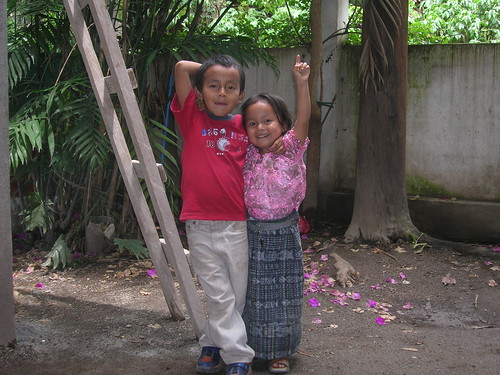
While trudging up a narrow mudsoaked paths snaking between buildings bearing an unweildy pack I couldn't help but question the wisdom of packing in a full size Latin American History textbook. That bloody thing is heavy! And by bloody I mean it both in the derogetory English slang as well as noting that it contains a long tale of gorey woe. If I make it through this thousand page opus I'll never have to prove my stubborn bullheadedness in any other way.
The good news, however, is that history is coming alive around me. While lounging in a hammock I read up on the history of the Mayan people and was shocked and fascinated. The Mayans are one of the oldest great civilizations of the Americas. By 900AD they were very advanced with a lot of sophisticated culture. They had ornate arts and crafts, systems of weaving that have yet to be replicated, advanced mathematics and astronomy that makes my head spin. For example they knew the earth wobbled on its axis once every 25,000 years; how could they possibly have figured that out?!?!
But then an odd thing happened. The organized part of the civilization just up and dissappeared. From around 900AD to 1200AD they were in a declining age, and things just collapsed for the two centuries after. Over fifty years BEFORE the Spanish got there the Mayans had long abandoned their great cities and splintered off into thousands of little villages doing their own thing slowly evolving their own language and culture. The Toltec civilization started moving in to take over, but even that didn't have as central a hold as the other great civilizations of that time (The Aztecs and Incas). And to this day historians don't agree, nor really know, what happened.
One positive effect it did have, though, it caused no end of trouble for the conquistadors. The Spanish had a relatively easy time conquering the vast and powerful centrally organized civilizations like the Inca and Aztecs. They pretty much captured or killed the leader and the will of the populace was broken. In Guatemala, however, they had to wage war with each and every little village they came across. And oftentimes even gunpowder failed so they needed to send their priests in to convert villages to Catholocism. The fact that the Spanish had such a hard time taking over has a lot to do with why today the vast majority of the population of this country is native (and the highest concentration in the Americas).
What blew my mind, here, was yesterday I was chatting with Clara (mi profesora) in the mistake-ridden painfully slow way I do en espanol. She was telling me about Mayans today, in the country of Guatemala. She said that there are 32 different Mayan languages and cultures in this country right now. And that because of the splintering of civilization a millenia ago they can't communicate with eachother. And this affects things really deeply and profoundly. First of all, Spanish is the closest thing to a common language people share here but the many rural youth are not sent to school (or, if they happen to be born female, not allowed to)so don't speak it. They only speak a language that a small subset of their country shares. So it'd be almost impossible for a Mayan musician or author to make a living writing for their people. And it makes it so that politicians elected (or appointed) exclusively speak a language that many of their fellow countrymen don't share.
Suddenly it's easy to see where many (certainly not all) of Guatemalas political and social woes come from. And it also makes it that much harder for me to think of a way to make things work better. Do they try to standardize the language to Spanish and thus lose much of the beauty of one of the more profound civilizations that walked the earth? Or do they embrace the rich native culture at the cost of a functioning representative democracy and an efficient economic system? I certainly don't know what the answers are, but I'm curious to see what the very honest, faithful, and cultured Guatemalan people do.
No comments:
Post a Comment